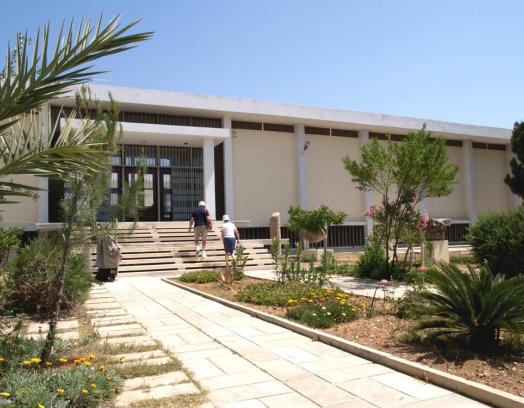Cypriot cuisine lies at the heart of the local lifestyle and is therefore the key to learning more about the island’s customs... Here, we’ll tell you the best way to explore this rich culture and take your taste buds on a culinary adventure without breaking the bank.
Our overview is for those who have been to Cyprus more than once or intend to visit for a longer stay. It will help you get to grips with what’s on offer in the local supermarkets and markets and how much it should cost... how to navigate the various meze and dessert offerings and make the right choice, and appreciate the bouquet of local drinks, etc.
Let’s start with the most important thing: Cypriot cuisine — it’s features and culinary delights.
Meze
Those in the know suggest trying out the whole range of Mediterranean dishes only found in Cyprus.
In fact, there’s more to Cyprus than just food and wine. If you want to do something else, check out our guide. However, if tasting quality local wines is what you’re after, see our article. For more information on local dishes, see this link.
The budget option in this case is a meze, a special menu (either fish or meat-based) comprising of a variety of dishes. Before you order, it’s a good idea to ask what exactly is included in the offer. Mezes should be made up of 15-20 dishes and should be served with side dishes or a salad, a bread basket, a dessert afterwards, and drinks of your choice.
Tip: Order one meze for four people not two as is suggested in most menus. Otherwise, you might not be able to manage it all.
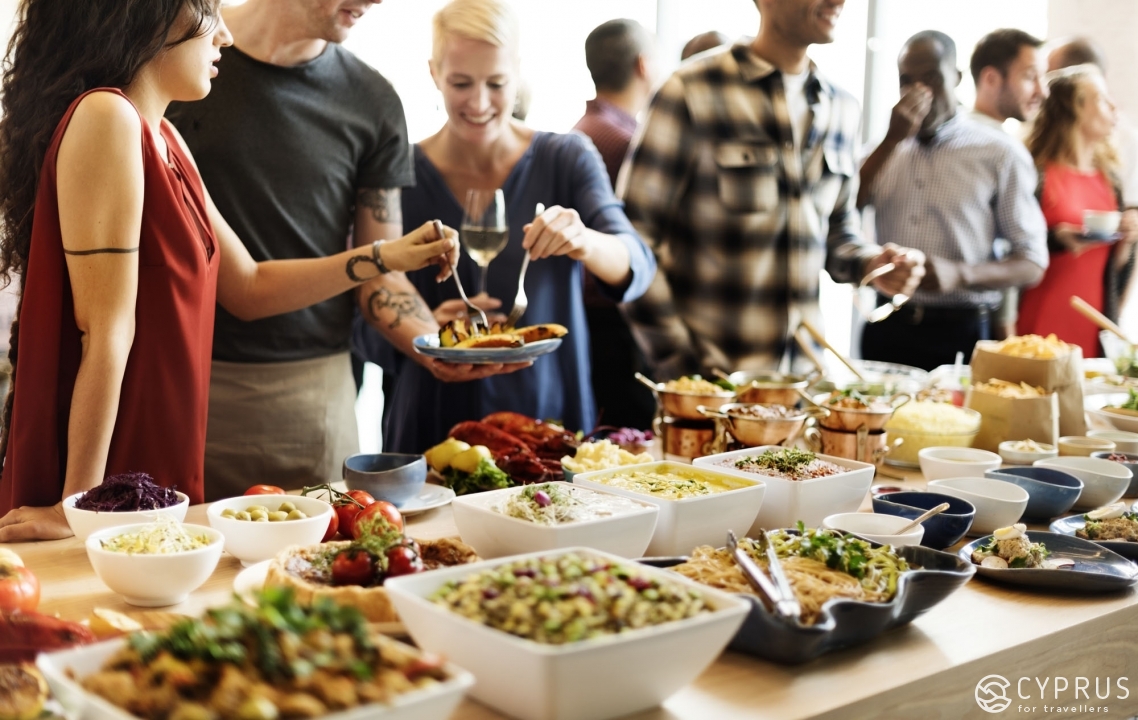
Fast food
We don’t always we have the time (even in Cyprus), money, or desire to put the hours into choosing a restaurant [1], enjoying a leisurely time there and then waiting for the waiter to bring the bill with the same unhurried take on life! What’s more, that bill might end up pretty pricey.
Even if you aren’t a fast food fan, it’s worth giving the Mediterranean version a go. Until recently, there was a chain of Greek snack bars called Goody's in Cyprus, and these days each region has its own souvlaki master who will whip up grilled meat or sheftalia (fried sausages) in a pita, or gyros (a type of kebab in flatbread with sauce and vegetables), or a generously filled sandwich with ham, halloumi cheese and other ingredients.
If you’re lucky, you’ll soon become friends with the owner. Having a local friend will mean you have the chance to enjoy freshly-prepared food and get the latest local news and gossip first hand a few times a week! What’s more, you’ll save money! As a regular, you’ll be offered an even lower price at «mate’s rates», making this bargain option even easier on your wallet.
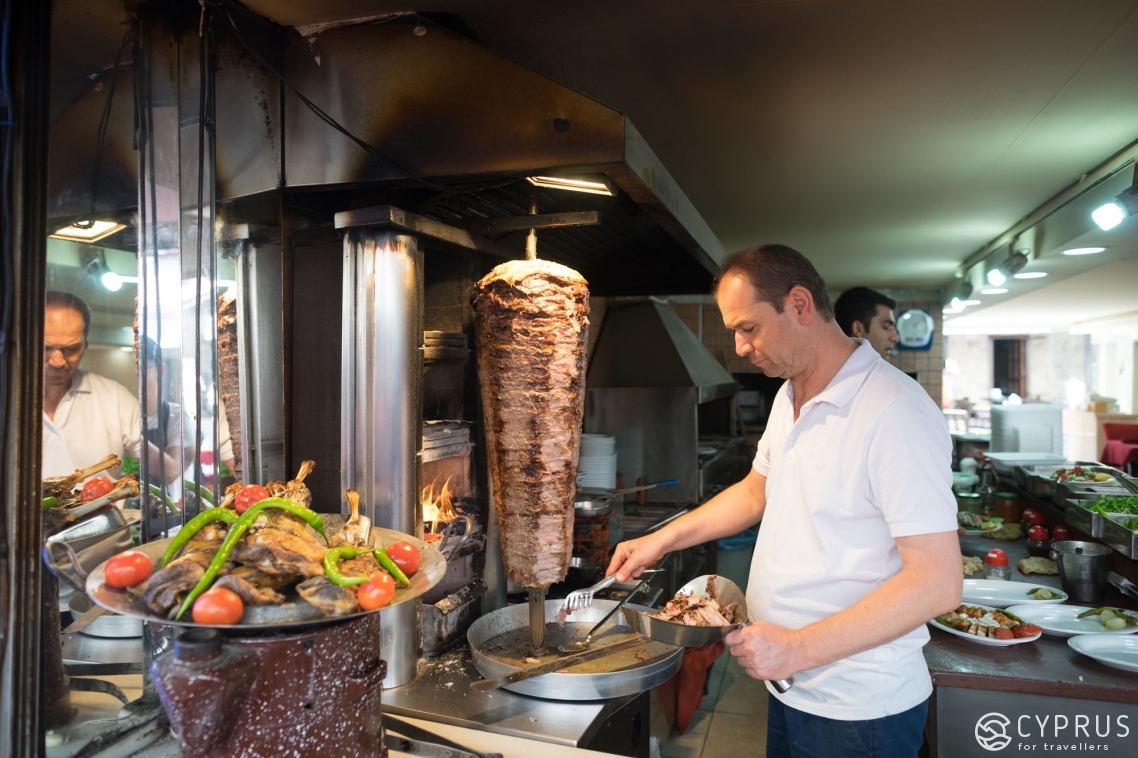
Tip: if you are new to the «creativity» with which sandwiches and souvlaki are prepared, ask the vendor to add less salt otherwise you can end up with something really intense because of all the smoked ingredients and the liberal quantities of salt used by the locals. Also, ask them not to grill your food too much as pieces of souvlaki can sometimes be over-cooked until they are tough and dry.
It’s worth following the «everything in moderation» maxim as you explore what else is on offer…
At the supermarket and the market
In Cyprus, local food markets [2] such as the Old Town Market in Paphos, are open 6 days a week in the morning for the most part. In Nicosia, however, it’s a bit different: the newly renovated and modernised Agios Antonios Municipal Market or Central Market is open seven days a week while other markets across the city are open on different days. The Old Centre (at the town car park at the D'Avila Bastion near Ochi Square) is open on Wednesdays and Saturdays, and there’s a market near the old Orphanides shopping centre in Strovolos on Fridays
We’d also like to point out that the markets here have fixed prices and haggling isn’t the norm. You might be able to talk the price down with a private vendor in a small village or in a tourist area. This differs from non-food shops and stalls: here you can pick up something you’re interested in and there’s a chance of lowering the price or getting a discount on your next purchase by chatting and «making friends» with the vendor.
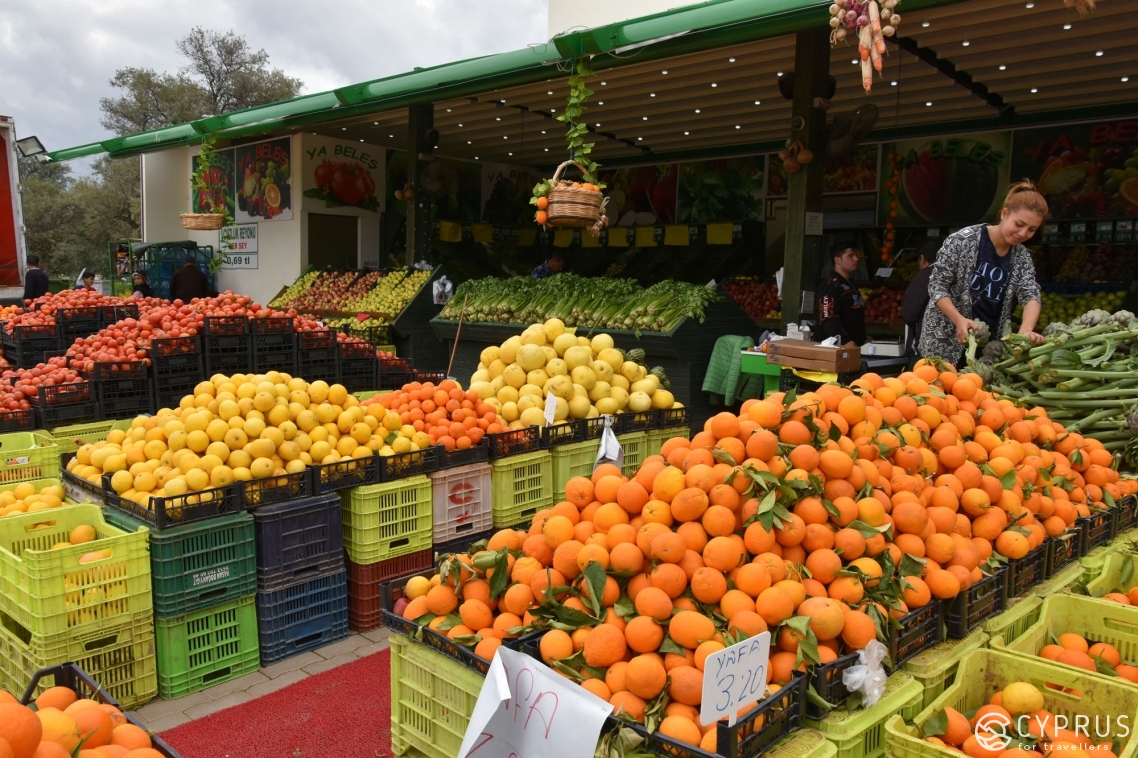
It’s worth remembering that poultry and fish are the most expensive of the readily available meats. Pork and beef are generally much cheaper. Incidentally, fruit and vegetables are not that cheap at the moment, even the ones grown in Cyprus.
However, supermarkets like Lidl, PopLife, Iceline and other budget chains usually have special offers on certain products each week, including fruit and vegetables. It’s a good idea to check out the catalogues, available in store or online, for promotions and discounts. There are also more expensive supermarket chains such as Alfamega, Metro or Carrefour that have the same offers meaning you can also often find practically the same items at lower prices than their competitors.
It’s worth shopping around to get the best prices. Go to different shops, look at what’s on offer and scope out the prices. That way you’ll avoid paying top dollar for the ingredients you need to cook tasty meals for your friends and family with local delicacies and fresh seasonal fruits and vegetables.
Sweet Treats and Desserts
First-timer visitors to Cyprus’ many bakeries and patisseries are always delighted by the range on offer. Be careful not to get carried too away though: first off, there’s the risk of gaining weight in your first months in Cyprus, then there’s danger of experiencing digestion issues because of huge amounts of sugar in all the products.
That’s the way it is here. However, those with sophisticated tastes can still find a sweet delicacy that will hit the spot and become their regular choice alongside a cup of Cypriot coffee, one of the local herbal teas or simply ... a glass of chilled water. This is, in fact, a local tradition: each bite of the pastry should be enjoyed as if it’s the first after a sip of water to cleanse the palate.
A lot of people take up baking and start cooking for themselves. This could also be your new hobby: markets all over the island sell a wide variety of herbs and spices, and you can find all manner of recipes on breakfast and daytime television shows, social networks and forums, and cookery courses. (For example this and this).

A sure-fire way of refreshing yourself in Cyprus on a hot afternoon: drive to one of the mountain villages, and in the cool shade by a mountain stream, enjoy the hospitality of the friendly locals and order a «glyko tou koutaliou» in a café. It literally translates as «sweet on a spoon» and consists of fragrant fruit and berries boiled in syrup with lemon juice and is best slowly savoured with a glass water with ice.
You can also stock up on this treat and take a jar of «a summer day in Cyprus» with you: the villagers make these and other kinds of preserves, candied fruits, sweets, and jams in large volumes and in a bewildering assortment. There’s something to suit every taste: peaches, quinces, cherries and walnuts, bergamot, kumquat ... even carrots and aubergines! Each one is worth a try!
Other popular treats include souzoukos and palouze, made from grape juice boiled into a jelly. They are both a healthy way to snack especially if carob is added.
In general, prices are pretty low but can vary depending on the number of tourists in the region.
Wine and Other Drinks
For more information about sampling Cyprus’ alcoholic offerings, check out our article with detailed recommendations. Take a look at our article about zivania too. Armed with this info, you’ll feel more in-the-know at the wine boutique or supermarket and make the right choice based on your preferences, the dishes you’re planning to serve, snacks at friendly gatherings, and of course, your budget.
Cyprus is also known for its healthy, non-alcoholic drinks enjoyed by adults and kids alike. Apart from the huge array of freshly squeezed juices, you should definitely try ayrani, a sour yoghurt drink, (a variation of ayran enjoyed in other countries). It’s a drink made from sour milk and water, dried mint and salt. Other drinks worth trying include home-made fruit syrups and lemonades, as well as orangeades and a mandarin variation.
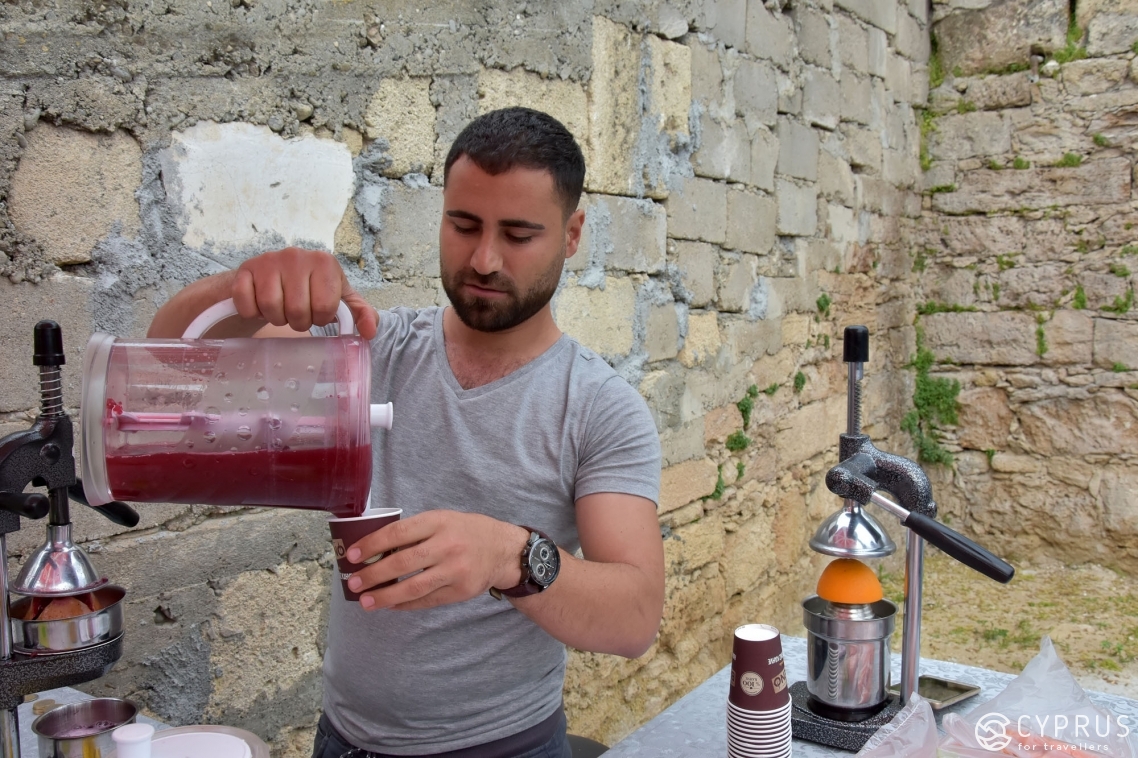
Cyprus also produces our favourite kefir with varying fat content. Soumada is an unusual, slightly bitter almond syrup that is known as the «drink of happiness» in Cyprus and in Greece. It’s usually shop-bought rather than home-made and is added in small quantities to hot water producing a drink with an opaline colour and an unforgettable aroma.
It is drunk in the cold winter weather.
Alternative winter drinks include carob with milk and cinnamon or mulled wine. Learn how to make it in true Cypriot style here.
The Cypriots also serve various herbal mixes and drinks and call proudly them «tea». They are really healthy and sometimes boast astoundingly unusual combinations of flavours that can even surprise those of us who remember the herbal concoctions our grandmothers would brew up in our childhood for us to enjoy after a day spent playing in the snow.
Rose water cordial is another Cyprus mainstay (it has been produced for centuries from the damask rose) and is added to cocktails, drinks, and desserts, It forms the basis of liqueurs and ice cream and is the key ingredient in the drink, triantafyllo (which translates as rose), which is made by adding the cordial to cold milk or chilled water.
Smoothies of all kinds are also a popular drink on hot summer days.
Cypriot coffee deserves a separate mention. It’s a fixture in Cyprus: absolutely everyone drinks it all the time. Alongside the classic kafe kipriako and mocha, Cypriots also love long drinks such as frappes and other light, milk-based coffees: lattes, cappuccinos, and espressos con pannas.
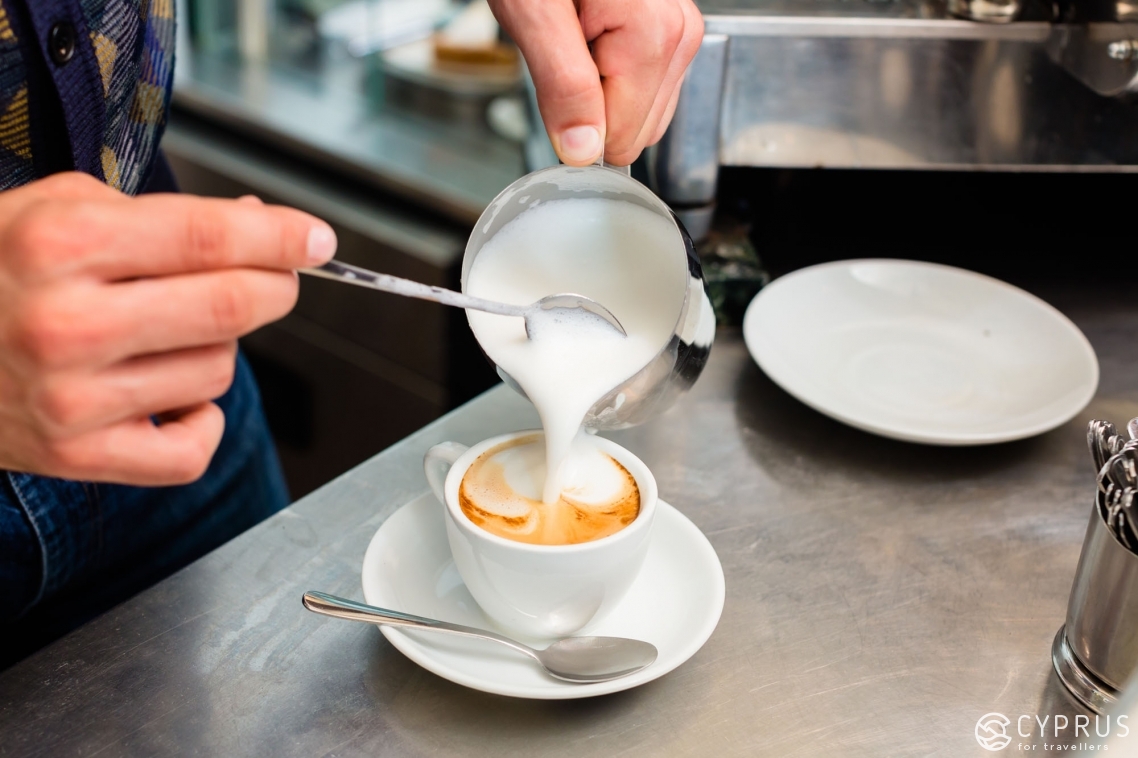
Pickled, Smoked and Salted Delicacies
Even those who arrive in Cyprus from northern climes can seek out something familiar in Cyprus with some success. However, don’t kid yourself: the culture of preserving food is somewhat different here. For example, unlike the soft and mildly salted fish you’re used to back home, salted fish in Cyprus might seem «mummified» in granules of salt. To actually eat it, you need the local Cypriot savvy when it comes to food and its preparation.
For those who still want to enjoy a little taste of home and have access to their favourite dishes and snacks, there are a number of local shops selling food from Russian, Bulgarian, Romanian, Polish and other cuisines.
A tip from an experienced traveller: be aware that these shops selling national cuisine are not always as scrupulous as the standard local shops and should be visited with caution. You might come across out-of-date or stale goods there. What’s more, when you open them up, you might find that the product is simply a poor imitation of a well-known dish or recipe.
Again, take your time, always check the expiration dates, and take a good look at the product: how similar is it in form, colour and smell to what you’re used to eating at home? How trustworthy does the shop itself seem to you?
[1] I advise checking out the site www.cypriotandproud.com. This blog focuses on Cypriot cuisine and publishes reviews with ratings of a wide range of eateries: from snack bars and cafes to restaurants.
[2] For more information, take a look at local government websites.
Stay tuned for our latest updates! Happy Travelling!







